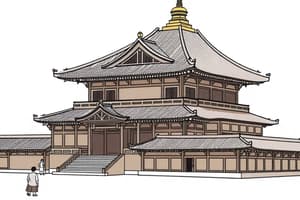Podcast
Questions and Answers
কোনটি জনপ্রিয় সভ্যতা যা মেসোপটেমিয়া এবং মিশরের সঙ্গে তালিকাভুক্ত নয়?
কোনটি জনপ্রিয় সভ্যতা যা মেসোপটেমিয়া এবং মিশরের সঙ্গে তালিকাভুক্ত নয়?
- ইন্দাস উপত্যকা
- রোম
- চীন
- জাপান (correct)
ঐতিহাসিক যুদ্ধে কোনটি সবচেয়ে গুরুত্বপূর্ণ ফলাফলের দিকে ইঙ্গিত করে?
ঐতিহাসিক যুদ্ধে কোনটি সবচেয়ে গুরুত্বপূর্ণ ফলাফলের দিকে ইঙ্গিত করে?
- বিশ্বযুদ্ধ (correct)
- अमेरिकन गृह युद्ध
- ক্রুসেড
- নেপোলিয়নিক যুদ্ধ
কোনটি মধ্যযুগের অন্যতম মূল বৈশিষ্ট্য?
কোনটি মধ্যযুগের অন্যতম মূল বৈশিষ্ট্য?
- শিল্প সংস্কৃতি
- গ্রিক গণতন্ত্র
- ফিউডালিজম (correct)
- তথ্য বিপ্লব
কোনটি রবিবার অতীতের ঘটনাবলীর তারিখ নির্দেশ করে?
কোনটি রবিবার অতীতের ঘটনাবলীর তারিখ নির্দেশ করে?
নতুন উদ্যোগের জন্য ধন্যবাদ, কোন মহাদেশের সমৃদ্ধি ঘটে?
নতুন উদ্যোগের জন্য ধন্যবাদ, কোন মহাদেশের সমৃদ্ধি ঘটে?
Flashcards are hidden until you start studying
Study Notes
Main Themes in History
- Civilizations: Study of major civilizations such as Mesopotamia, Egypt, Greece, Rome, China, and the Indus Valley.
- Empires: The rise and fall of empires, including the Roman Empire, Byzantine Empire, Mongol Empire, and British Empire.
- Wars and Conflicts: Key wars like the World Wars, the American Civil War, the Napoleonic Wars, and colonial conflicts.
- Revolutions: The impact of revolutions such as the American Revolution, French Revolution, Industrial Revolution, and Russian Revolution.
Important Historical Periods
-
Prehistoric Era:
- Paleolithic and Neolithic Ages
- Development of tools and agriculture
-
Ancient History:
- Formation of early states and societies
- Invention of writing
-
Classical Antiquity:
- Emergence of democracy in Greece
- Roman law and governance
-
Middle Ages:
- Feudalism in Europe
- Spread of Islam and the Crusades
-
Renaissance:
- Rebirth of art, culture, and intellectual pursuit
- Humanism and exploration
-
Modern Era:
- Industrialization and the rise of nation-states
- Global conflicts and ideologies (e.g., capitalism, socialism)
Key Historical Figures
- Alexander the Great: Conqueror who spread Hellenistic culture.
- Julius Caesar: Roman general and statesman played a critical role in the demise of the Roman Republic.
- Cleopatra: Last Pharaoh of Ancient Egypt known for her alliances with Julius Caesar and Mark Antony.
- Genghis Khan: Founder of the Mongol Empire.
- Napoleon Bonaparte: Military leader who rose to prominence during the French Revolution.
Methodologies in History
- Primary Sources: Original documents, artifacts, or other sources created during the time being studied.
- Secondary Sources: Analyses, interpretations, or critiques based on primary sources.
- Historiography: The study of historical writing and perspectives on historical events.
Key Concepts
- Chronology: The arrangement of events in the order they occurred.
- Causation: Understanding the causes and effects of historical events.
- Continuity and Change: Examining what has remained constant and what has changed over time.
- Context: The historical circumstances surrounding an event or period.
Influential Documents
- Magna Carta (1215): Established the principle that everyone is subject to the law.
- U.S. Declaration of Independence (1776): Asserted the colonies' independence from Britain.
- United Nations Charter (1945): Established the foundation for international cooperation post-World War II.
Historical Patterns
- Survival and Adaptation: How societies evolve in response to environmental and social changes.
- Conflict and Resolution: The role of conflict in shaping societies and fostering political changes.
- Cultural Exchange: The influence of trade, migration, and conquest on cultural development.
Conclusion
Understanding history involves exploring various themes, periods, and figures, focusing on how past events shape the present and future. Emphasizing the importance of sources, methodologies, and critical analysis enables a deeper grasp of societal development.
প্রাচীন সভ্যতা ও সাম্রাজ্যসমূহ
- মেসোপটেমিয়া, মিশর, গ্রীস, রোম, চীন এবং সিন্ধু উপত্যকার মতো গুরুত্বপূর্ণ প্রাচীন সভ্যতাগুলির উত্থান ও পতন।
- রোমান সাম্রাজ্য, বাইজেন্টাইন সাম্রাজ্য, মঙ্গোল সাম্রাজ্য এবং ব্রিটিশ সাম্রাজ্যের মতো বিশাল সাম্রাজ্যগুলির উত্থান ও পতনের ইতিহাস।
যুদ্ধ ও সংঘাত
- বিশ্বযুদ্ধ, মার্কিন গৃহযুদ্ধ, নেপোলিয়ান যুদ্ধ এবং ঔপনিবেশিক যুদ্ধের মতো গুরুত্বপূর্ণ যুদ্ধ ও সংঘাতের প্রভাব।
বিপ্লব ও পরিবর্তন
- আমেরিকান বিপ্লব, ফরাসি বিপ্লব, শিল্প বিপ্লব এবং রাশিয়ান বিপ্লবের মতো বিপ্লবগুলির প্রভাব ও তাদের দীর্ঘমেয়াদী প্রভাব।
গুরুত্বপূর্ণ ঐতিহাসিক যুগ
- প্রাক-ঐতিহাসিক যুগ: প্যালিওলিথিক ও নবপाषाण যুগ, উপকরণ ও কৃষিকাজের উদ্ভাবন।
- প্রাচীন ইতিহাস: প্রাথমিক রাষ্ট্র ও সমাজের গঠন, লিখনীর উদ্ভাবন।
- ক্লাসিক্যাল প্রাচীন যুগ: গ্রীসে গণতন্ত্রের উত্থান, রোমান আইন ও শাসন।
- মধ্যযুগ: ইউরোপে সামন্তবাদ, ইসলামের বিস্তার এবং ক্রুসেড।
- পুনর্জাগরণ: শিল্প, সংস্কৃতি ও বুদ্ধিবৃত্তিক চেতনার পুনর্জন্ম, মানবতাবাদ ও অন্বেষণ।
- আধুনিক যুগ: শিল্পায়ন ও জাতিরাষ্ট্রের উত্থান, বিশ্বব্যাপী সংঘাত ও আদর্শ (যেমন: পুঁজিবাদ, সমাজতন্ত্র)।
গুরুত্বপূর্ণ ঐতিহাসিক ব্যক্তিত্ব
- আলেকজান্ডার দ্য গ্রেট: হেলেনিস্টিক সংস্কৃতির প্রসার ঘটানো বিজয়ী।
- জুলিয়াস সিজার: রোমান সেনাপতি ও রাজনীতিবিদ, রোমান প্রজাতন্ত্রের পতনে গুরুত্বপূর্ণ ভূমিকা পালন করেছিলেন।
- ক্লিওপেট্রা: প্রাচীন মিশরের শেষ ফারো, জুলিয়াস সিজার ও মার্ক অ্যান্টনি-এর সাথে তার মিত্রতা সুপরিচিত।
- গেঞ্জিস খান: মঙ্গোল সাম্রাজ্যের প্রতিষ্ঠাতা।
- নেপোলিয়ন বোনাপার্ট: ফরাসি বিপ্লবের সময় খ্যাতি অর্জনকারী সামরিক নেতা।
ঐতিহাসিক পদ্ধতি
- প্রাথমিক উৎস: অধ্যয়নকালীন সময়ে তৈরি মূল দলিল, নিদর্শন বা অন্যান্য উৎস।
- গৌণ উৎস: প্রাথমিক উৎসের উপর ভিত্তি করে বিশ্লেষণ, ব্যাখ্যা বা সমালোচনা।
- ঐতিহাসিকতত্ত্ব: ঐতিহাসিক রচনা ও ঐতিহাসিক ঘটনা সম্পর্কে দৃষ্টিভঙ্গির অধ্যয়ন।
মূল ধারণাসমূহ
- কালানুক্রম: ঘটনাগুলির ক্রমানুসারে বিন্যাস।
- কারণ ও কার্য: ঐতিহাসিক ঘটনার কারণ এবং প্রভাব বোঝা।
- নিরন্তরতা ও পরিবর্তন: কি কি অপরিবর্তিত রয়েছে এবং সময়ের সাথে কি কি পরিবর্তন হয়েছে তা পরীক্ষা করা।
- প্রেক্ষাপট: একটি ঘটনা বা সময়কালকে ঘিরে থাকা ঐতিহাসিক পরিস্থিতি।
প্রভাবশালী দলিল
- ম্যাগনা কার্টা (১২১৫): সকলেই আইনের অধীন থাকার নীতি স্থাপন করেছিল।
- মার্কিন স্বাধীনতা ঘোষণাপত্র (১৭৭৬): ব্রিটেন থেকে উপনিবেশের স্বাধীনতা দাবি করেছিল।
- জাতিসংঘের সনদ (১৯৪৫): দ্বিতীয় বিশ্বযুদ্ধের পর আন্তর্জাতিক সহযোগিতার ভিত্তি স্থাপন করেছিল।
ঐতিহাসিক ধারা
- সামঞ্জস্য ও অভিযোজন: পরিবেশগত ও সামাজিক পরিবর্তনের প্রতিক্রিয়া হিসেবে সমাজ কীভাবে বিকশিত হয়।
- সংঘাত ও সমাধান: সমাজ গঠন এবং রাজনৈতিক পরিবর্তনকে উন্নত করার ক্ষেত্রে সংঘাতের ভূমিকা।
- সংস্কৃতিক বিনিময়: বাণিজ্য, অভিবাসন এবং বিজয় সংস্কৃতির বিকাশে কী প্রভাব ফেলেছে।
উপসংহার
ইতিহাস বোঝার জন্য বিভিন্ন থিম, যুগ এবং ব্যক্তিত্ব অন্বেষণ করা প্রয়োজন, অতীতের ঘটনা বর্তমান ও ভবিষ্যৎকে কীভাবে গঠন করে তা বিশ্লেষণ করা। উৎস, পদ্ধতিবিদ্যা এবং সমালোচনামূলক বিশ্লেষণের গুরুত্বকে জোর দেওয়া সমাজের বিকাশের গভীর বোধ সৃষ্টি করে।
Studying That Suits You
Use AI to generate personalized quizzes and flashcards to suit your learning preferences.




